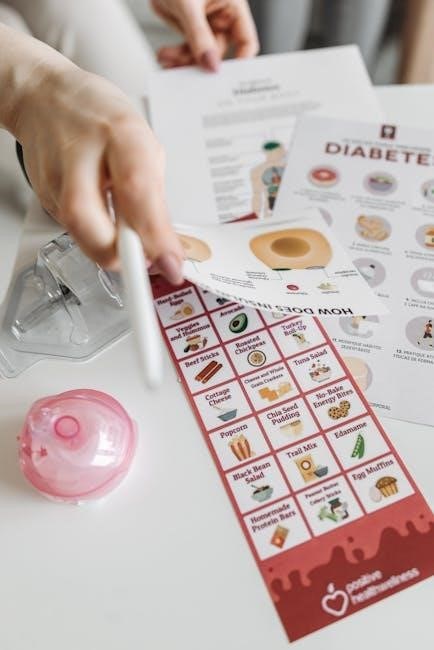pcos diet plan to get pregnant pdf
Category : PDF
Polycystic Ovary Syndrome (PCOS) affects 6-12% of women‚ impacting fertility and overall health․ A tailored diet plan is essential for managing symptoms‚ balancing hormones‚ and enhancing fertility․
Understanding PCOS and Its Impact on Fertility
Polycystic Ovary Syndrome (PCOS) is a hormonal disorder affecting 6-12% of women‚ often causing irregular periods‚ insulin resistance‚ and high androgen levels․ These hormonal imbalances disrupt ovulation‚ leading to infertility․ Women with PCOS may experience anovulation or poor egg quality‚ making conception challenging․ Addressing these issues through dietary changes can improve insulin sensitivity‚ regulate hormones‚ and enhance fertility‚ offering hope for pregnancy despite PCOS․
Why Diet Plays a Crucial Role in Managing PCOS Symptoms
Diet significantly impacts PCOS symptoms by influencing hormonal balance‚ insulin sensitivity‚ and inflammation․ Eating a balanced diet helps regulate blood sugar‚ reducing insulin resistance and high testosterone levels‚ which are common in PCOS․ Anti-inflammatory foods can alleviate inflammation‚ improving overall health․ Additionally‚ a healthy diet aids in weight management‚ crucial for menstrual regularity and fertility․ Tailoring dietary choices to individual needs can lead to better symptom control and improved quality of life for women with PCOS․
The Link Between PCOS and Fertility
PCOS disrupts fertility by causing hormonal imbalances‚ irregular ovulation‚ and insulin resistance․ While many women with PCOS can conceive‚ managing symptoms through diet and lifestyle improves chances․
How Hormonal Imbalances Affect Ovulation
Hormonal imbalances‚ particularly high androgen levels‚ disrupt ovulation in PCOS․ This leads to irregular menstrual cycles‚ anovulation‚ and reduced egg quality․ Insulin resistance exacerbates these issues by further unbalancing hormones‚ creating a cycle that hinders fertility․ Addressing these imbalances through dietary changes can help restore regular ovulation and improve reproductive health․
How Diet Can Improve Ovulation and Egg Quality
A well-structured PCOS diet focuses on balancing hormones and improving insulin sensitivity‚ which are crucial for restoring ovulation․ By incorporating high-fiber foods‚ lean proteins‚ and healthy fats‚ women can regulate blood sugar levels and promote hormonal balance; This dietary approach also enhances egg quality by reducing inflammation and oxidative stress‚ increasing the chances of conception and improving overall reproductive health․

The Foundation of a PCOS Diet Plan
A PCOS diet plan focuses on balancing hormones‚ improving insulin sensitivity‚ and managing weight․ It emphasizes high-fiber‚ lean proteins‚ and healthy fats to stabilize blood sugar levels and reduce inflammation․
Key Principles for a Fertility-Friendly Diet
A fertility-friendly diet for PCOS focuses on improving insulin sensitivity‚ balancing hormones‚ and supporting ovulation․ Emphasize whole‚ unprocessed foods like vegetables‚ fruits‚ whole grains‚ lean proteins‚ and healthy fats․ Avoid sugary drinks‚ refined carbohydrates‚ and processed foods․ Incorporate anti-inflammatory foods and omega-3 rich options to enhance hormonal balance․ Portion control and mindful eating are also crucial for maintaining a healthy weight‚ which further supports fertility and overall well-being for women with PCOS․
The Role of Macronutrients: Carbohydrates‚ Proteins‚ and Fats
For PCOS‚ balancing macronutrients is key․ Focus on complex carbohydrates like whole grains to stabilize blood sugar․ Include lean proteins such as poultry‚ fish‚ and legumes to support hormone production․ Healthy fats‚ including avocados‚ nuts‚ and olive oil‚ reduce inflammation and promote hormone balance․ Avoid refined carbs and saturated fats to manage insulin resistance and improve fertility outcomes․ A balanced mix of these macronutrients supports overall hormonal and reproductive health․

Specific Dietary Recommendations for PCOS
A tailored diet focusing on high-fiber foods‚ lean proteins‚ and healthy fats is essential․ Avoid processed foods‚ sugary drinks‚ and refined carbohydrates to balance insulin levels and hormones․
Foods to Include: High-Fiber‚ Lean Proteins‚ and Healthy Fats
Incorporate high-fiber foods like whole grains‚ fruits‚ and vegetables to stabilize blood sugar․ Lean proteins such as chicken‚ fish‚ and tofu support hormone regulation․ Healthy fats‚ including avocados‚ nuts‚ and olive oil‚ reduce inflammation and improve insulin sensitivity․ These foods promote weight management and enhance fertility‚ making them essential for a PCOS diet plan aimed at improving pregnancy chances․
Foods to Avoid: Processed Foods‚ Sugary Drinks‚ and Refined Carbohydrates
Eliminate processed foods‚ sugary drinks‚ and refined carbohydrates to minimize insulin resistance and inflammation․ These foods disrupt hormonal balance‚ worsening PCOS symptoms․ Opting for whole‚ nutrient-dense foods instead helps regulate blood sugar‚ improve ovulation‚ and support fertility‚ making them crucial exclusions in a PCOS diet plan designed to enhance pregnancy chances and overall health․

Meal Planning and Recipes
A well-structured meal plan with balanced nutrition supports fertility and manages PCOS symptoms․ Incorporate fertility-friendly recipes rich in whole foods‚ lean proteins‚ and healthy fats for optimal results․
Breakfast‚ Lunch‚ and Dinner Ideas for Fertility
Start your day with a spinach and avocado omelet or Greek yogurt with berries․ For lunch‚ opt for grilled chicken salad with mixed greens and olive oil dressing․ Dinner ideas include baked salmon with quinoa and steamed broccoli․ Incorporate high-fiber‚ lean proteins‚ and healthy fats․ Snacks like nuts and fruits support hormone balance․ These meals help stabilize blood sugar‚ improve insulin sensitivity‚ and boost fertility naturally․
Snacks and Drinks That Support Hormone Balance
Opt for snacks like raw nuts‚ seeds‚ and fresh fruits to maintain blood sugar levels․ Include vegetables with hummus or avocado for healthy fats․ Herbal teas‚ such as peppermint or chamomile‚ and water with lemon support hydration and balance․ Avoid sugary drinks and processed snacks․ These choices promote insulin sensitivity and hormone regulation‚ essential for PCOS management and fertility;

Supplements and Nutrients for Fertility
Essential nutrients like folate‚ zinc‚ and vitamin D support hormone balance and ovarian function․ Supplements such as inositol and omega-3 fatty acids may improve insulin sensitivity and egg quality․
Vitamins and Minerals Essential for PCOS Management
Vitamins like folate and D‚ along with minerals such as zinc and magnesium‚ play a crucial role in regulating hormones and improving ovarian function․ Folate supports egg health‚ while vitamin D aids in hormone balance․ Zinc is vital for insulin regulation‚ and magnesium helps reduce inflammation․ Incorporating these nutrients into your diet can enhance fertility and overall well-being for women with PCOS‚ supporting their journey toward pregnancy․
Herbal Supplements That May Boost Fertility
Certain herbal supplements‚ such as maca root‚ chasteberry‚ and saw palmetto‚ may support hormonal balance and improve fertility in women with PCOS․ Maca root is known to enhance ovarian function‚ while chasteberry regulates menstrual cycles․ Saw palmetto helps reduce androgen levels‚ addressing hormonal imbalances․ These natural remedies‚ when combined with a balanced diet‚ can potentially improve fertility outcomes for women trying to conceive with PCOS․

Monitoring Progress and Adjusting the Diet Plan
Track weight‚ blood sugar‚ and hormonal changes to monitor progress․ Adjust the diet plan based on improvements in insulin sensitivity and fertility indicators to optimize results․
Tracking Weight‚ Blood Sugar‚ and Hormonal Changes
Regularly monitor weight‚ blood sugar levels‚ and hormonal fluctuations to assess progress․ Tracking insulin sensitivity and menstrual regularity helps identify adjustments needed in the diet plan․ Consistent monitoring ensures tailored modifications‚ improving ovulation and conception chances․ Adjustments may include carb intake‚ protein balance‚ or healthy fat sources to optimize hormonal equilibrium and fertility outcomes for women with PCOS striving to conceive․
When and How to Modify Your Diet Plan
Adjust your diet based on progress in weight‚ blood sugar‚ and hormonal balance․ If weight loss plateaus or insulin resistance persists‚ reduce carb intake or increase protein․ Incorporate physical activity to enhance insulin sensitivity․ Consider supplements like inositol or chromium if blood sugar remains unstable․ Regularly reassess portion sizes and food choices to maintain hormonal equilibrium and optimize fertility outcomes for pregnancy․

Lifestyle Changes to Enhance Fertility
Incorporating regular exercise‚ managing stress‚ and maintaining a healthy weight can significantly improve fertility outcomes for women with PCOS․ These lifestyle changes support hormonal balance and overall well-being․
The Role of Exercise in PCOS Management
Exercise is a cornerstone in managing PCOS‚ helping reduce insulin resistance and regulate hormonal imbalances․ Activities like walking‚ cycling‚ and strength training improve ovulation and metabolic health․ Regular physical activity supports weight management‚ a key factor in enhancing fertility․ By incorporating exercise into daily routines‚ women with PCOS can better control symptoms and improve overall reproductive health‚ boosting their chances of conception․

Stress Management Techniques for Hormonal Balance
Stress management is vital for women with PCOS‚ as chronic stress can worsen hormonal imbalances․ Techniques like mindfulness‚ yoga‚ and deep-breathing exercises help reduce cortisol levels‚ promoting hormonal balance․ Regular practice of these methods can improve emotional well-being and support fertility by creating a more stable physiological environment for conception and overall health management․

Common Myths and Facts About PCOS and Diet
Debunking myths about PCOS diets‚ such as the need for gluten-free or dairy-free plans‚ which lack evidence․ Focus on balanced nutrition‚ not restrictions‚ to support fertility and health․
Debunking Misconceptions About PCOS Diets
Many believe a gluten-free or dairy-free diet is essential for PCOS‚ but there’s no evidence to support this․ The focus should be on balanced nutrition‚ not unnecessary restrictions․ Myth: Cutting out entire food groups is required․ Fact: A tailored approach emphasizing whole foods‚ high fiber‚ and healthy fats is more effective for managing symptoms and improving fertility․ Avoid extreme diets and focus on sustainable‚ nutrient-rich choices․
Separating Fact from Fiction in Fertility Nutrition
While many believe strict diets like gluten-free or dairy-free are necessary for PCOS fertility‚ evidence shows balanced nutrition is key․ Fact: Focus on whole‚ nutrient-dense foods to regulate insulin and hormones․ Myth: Extreme weight loss is required for pregnancy․ Reality: Healthy habits‚ not a specific weight‚ improve fertility․ Prioritize high-fiber‚ lean proteins‚ and healthy fats to support hormone balance and conception naturally․
A well-structured PCOS diet plan‚ focusing on balanced nutrition and lifestyle changes‚ can significantly improve fertility and overall health․ Stay motivated‚ take control‚ and embrace a healthier tomorrow․
Summing Up the Key Points for Success
A PCOS diet plan focuses on balancing hormones‚ improving insulin sensitivity‚ and enhancing fertility․ Prioritize high-fiber foods‚ lean proteins‚ and healthy fats while avoiding processed foods and excess sugar․ Stay hydrated‚ maintain portion control‚ and consider meal timing․ Consistency is key to achieving hormonal balance and improving ovulation․ Combine dietary changes with regular exercise and stress management for optimal results․ Tracking progress and adjusting the plan as needed ensures long-term success․
Motivation and Next Steps for Achieving Pregnancy
Embracing a PCOS-friendly diet and lifestyle can significantly boost fertility and overall well-being․ Start by setting realistic goals and celebrating small milestones․ Consult a healthcare provider to personalize your plan․ Consider joining support groups for motivation and accountability․ Prioritize self-care‚ including stress management and regular physical activity․ Stay consistent with your diet and track progress to identify areas for improvement․ Believe in your journey and remain hopeful—many women with PCOS successfully conceive with the right approach․
